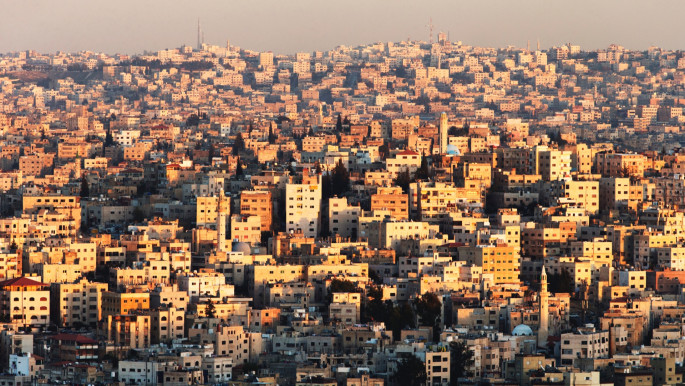Jordan's independent music scene turns crisis into opportunity under lockdown
But that has not stopped musicians from turning challenges into opportunities.
The independent or alternative music scene in Jordan began to emerge during the early 2000s, when bands such as Autostrad, JadaL and El Morabba3 developed a different sound to most mainstream platforms.
The 2011 Arab Spring was a tipping point, as new bands emerged alongside more established groups, making it easier for audiences, the media and companies to introduce the new sound as 'alternative Arabic music'.
"Back in 2005, when we established Al Balad Theater, there were few people who played music and had these kinds of art projects. Nowadays, the number is so huge that you do not know where to start listening," Raed Asfour, manager of Al Balad Theater, told The New Arab.
Al Balad Theater has become a cornerstone of the independent music scene through its projects to support artists, including production and outreach through Al Balad Music Festival, whose first edition took place in 2009.
 |
Jordan's thriving independent music scene has been hit hard by the coronavirus pandemic, as bands struggle to record and engage with fans during the lockdown |  |
"Jordanian musicians and bands have influenced the music movement in the Arab region and have left a clear signature on it," Asfour says. Independent bands face some common challenges though, with difficulties in audience outreach a prominent one.
"When you do not have the companies that can push your product, it is difficult to reach out. It is difficult to find someone you do not know," Yosour Al Zou'bi, violinist with Ayloul, told The New Arab.
| Instagram Post |
Independent band Ayloul (September, in the Syriac language) were established in 2013 in Irbid. The group's six members are originally from the Houran plain - extending between northern Jordan, Palestine and southern Syria – and the region has inspired their music, which they define as "cinematic Arab roots indie rock".
But outreach rather than money is the main problem that independent bands such as Ayloul face. "If you had the chance of reaching out and getting publicity, then funds will not be your problem at that stage," says Mounif Zghoul, Ayloul's backing vocalist and guitarist.
Other obstacles are the inability to dedicate full-time to music and the lack of venues for holding live shows, limited to a few music bars in Amman and other public places.
"How is it possible that with the amount of musicians existing in Jordan there are no spaces for them to play their music?" asks Asfour, who sees this as a priority issue to be addressed.
Impact of coronavirus
"The relation between corona[virus] and art is a hate-hate one," says Asfour, who believes that social detachment will prevent people from enjoying musical performances that need the energy of the crowd.
The economy of art and the music industry will be drastically affected, since virtual solutions do not satisfy musicians creatively or financially.
"The virtual technical spaces are dangerous despite their ease, since they give the listener the opportunity to listen and move quickly or refuse to continue without fulfilling the integrated listening conditions provided by the live music show," says Asfour.
Most festivals have been postponed or cancelled for 2020, including Jerash Music Festival and Amman Jazz Festival. After a successful 2019 when they released their first studio album "Salute to al-Ghor" and toured in Germany, Denmark and Morocco, 2020 was a promising year for Ayloul.
"We were having many concerts planned for the end of May in Germany, Sweden and Morocco, and some of the events were already announced, but everything has been cancelled," Abdel Fattah Terawee, Ayloul's bassist, told The New Arab.
The band finds it difficult to estimate the real impact of these cancellations due to the instability of the scene.
 |
The independent or alternative music scene in Jordan began to emerge during the early 2000s |  |
"Before the crisis, it was not already clear enough how to deal with the scene. Yes, you would be able to participate in festivals and make concerts, but you would not know how many people will come or how many tickets you will sell," says Al Zou'bi.
On top of this, their plans to record in a studio have been postponed since the two band members living abroad have not been able to travel to Jordan.
"As artists from the Middle East, we are more or less getting used to dealing with these difficulties, more than other artists," says Terawee, pointing to the struggle of dealing with visas and taking holidays from their full time jobs in order to be able to tour.
| Instagram Post |
From crisis to opportunity
Despite the crisis, the Jordanian scene is looking for ways to carry on. Al Balad Theater's team is meeting with festival organisers from all over the world to come up with solutions for musicians.
Al Balad Theater, during the curfew, participated with the most important music festivals in the world through Oslo World map of festivals, which allows fans to attend virtually. Each festival organiser uploads a 20-track playlist of their best songs, and Al Balad Music Festival was one of six selected events in the Arab world.
Telecom Egypt has also organised the WE Online Music Festival, which will feature concerts of many Arab independent bands during the months of May and June.
"We are intending to focus on ourselves as musicians rather than travelling and playing in front of the people. Our intention is to release as many new songs and materials as we can and reach out to our fans throught the internet," explains Terawee.
But the internet and social media are not without their challenges, especially since music is made available for free without any kind of compensation.
"Appreciating the work of an artist is not done by likes and shares online. I think the pandemic will give society the opportunity to understand the difference between free concerts and paid ones and how important it is," says Al Zou'bi.
 |
As artists from the Middle East, we are more or less getting used to dealing with these difficulties |  |
While some musicians are using their social media platforms to generate an income, Ayloul has not done so yet since they are not full-time musicians. They do, however, support the idea of providing economic aid to professional musicians.
Despite the challenges, some positives have emerged from this unprecedented situation. Ayloul released 'Ma Enkafa', a tribute to the frontline and key workers fighting against the virus, which was recorded in four days.
 |
|
| Read more: Gentrification and grassroots resistance in Amman's historic Jabal al-Weibdeh district |
"Our music is based on chemistry, so we are trying to use the lockdown to learn new things about how we communicate in order to keep producing. We are closer than normal days during this time," explains Al Zou'bi.
Besides, it has provided them with a solution to deal with the physical absence of the band's members.
"It was not an option for us, but now, because it is the only option, we have experienced it and we have succeeded in creating music. I think this will be considered as part of how we can make music in the future," says Al Zou'bi.
Asfour is also optimistic regarding the future since the crisis has showcased the work of many young musicians and music platforms.
"This gives you hope for the future with regards to the continuity of the scene".
Victoria Silva is a freelance journalist based in Jordan, covering Middle East affairs for Spanish media.
Follow her on Twitter: @VickyShishaz



![sudan women [getty] sudan women [getty]](/sites/default/files/styles/image_212x120/public/media/images/5019D7F4-52AF-4377-8A05-885D27476479.jpg?h=d1cb525d&itok=1Obcavax)